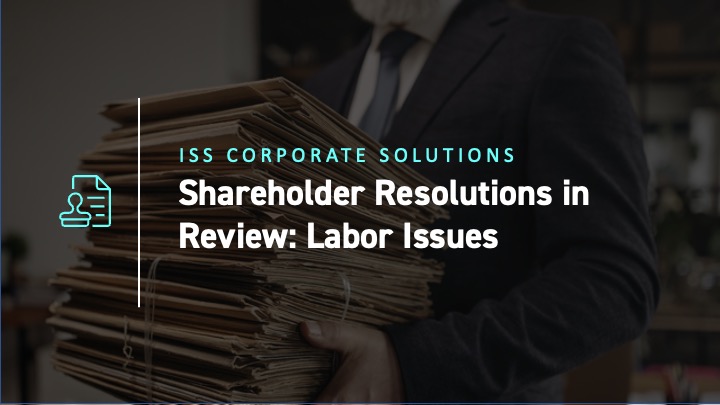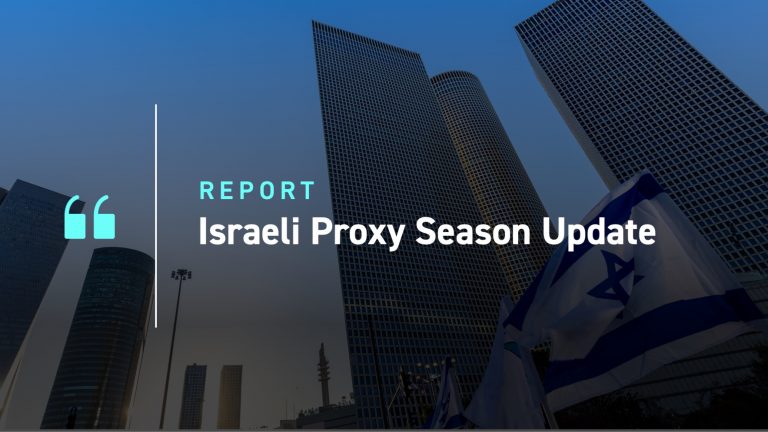More shareholder resolutions were filed in the 2022 proxy season than in the previous year, with approximately 932 environmental, social, and governance proposals submitted at U.S. companies so far compared with 903 in 2021, according to ISS Voting Analytics data. The number of proposals focusing on environmental and social issues is estimated to have risen from 500 in 2021 to approximately 588 in 2022. Though many proposals have since been withdrawn, many have been or will be voted on. According to data from ISS Corporate Solutions, 578 shareholder resolutions have either been voted on or are pending in annual meetings through November this year.
In this snapshot, we examine the results for resolutions on labor and workforce equity issues. Voting results are based on filings by companies through the end of the year.
The proposals examined cover:
- Harassment (including sexual harassment)
- Discrimination
- Diversity, equity and inclusion (DE&I)
- Arbitration
- Concealment clauses
- Paid sick leave
- Gender and racial pay gap disclosure
So far this year, 76 labor-related shareholder proposals were filed. Approximately half of those were withdrawn before the companies filed their proxy statements. That typically indicates that the company had come to an agreement to substantially implement the request. The majority of withdrawn proposals requested greater disclosure on corporate DE&I data. Two proposals on employee ownership were omitted after the SEC determined that they dealt with ordinary business operations of the company, per Rule 14a-8(i)(7). A further six proposals were not included in the proxy statement for other reasons. Two proposals are pending votes, while 28 went to a vote. Ten were challenged at the SEC unsuccessfully, including five that went to a vote.
Of the 28 proposals that were voted upon, seven received majority support and nine more received significant minority support, defined as at least 30 percent of votes cast. Of those that passed, four requested a report on concealment and arbitration clauses: at Apple, solar company SunRun, Twitter and IBM. The proposal at SunRun was supported by the board and management, leading to support by 98.2 percent of votes cast FOR and AGAINST. According to the shareholder resolution at Apple, “[c]oncealment clauses are defined as any employment or post-employment agreement, such as arbitration, non-disclosure or non-disparagement agreements, that Apple asks employees or contractors to sign which would limit their ability to discuss unlawful acts in the workplace, including harassment and discrimination.” The shareholder accepts that it is good business practice to use such clauses to protect corporate information, such as intellectual capital and trade secrets, but not to limit former employees from speaking out about potential abuses.
Average support for all types of employment issues-related proposals reached 37.4% of votes cast FOR and AGAINST. At five companies where proposals did not fare well, voting is controlled by either family trusts or groups of founders, including Alphabet (Google) and Meta Platforms (Facebook). In two of these cases, omitting controlled votes would have led to majority support for the proposals.
Other successful proposals requested reports on gender and/or racial pay gaps.
In addition to the seven proposals that passed, four resolutions fell just short of receiving majority support, including two at Charter Communications. The first of these requests sought disclosure of EEO-1 data (data the Equal Employment Opportunity Commission requires companies to report on the demographics of its workforce, including race/ethnicity, sex and job categories). The second was a request for a report on the effectiveness of the company’s DE&I efforts and metrics. Both received support by approximately 45 percent of votes cast FOR and AGAINST. Excluding the Charter shares owned by Liberty Broadband, both resolutions would have passed.
By: Paul Hodgson, Senior Editor ISS Corporate Solutions




